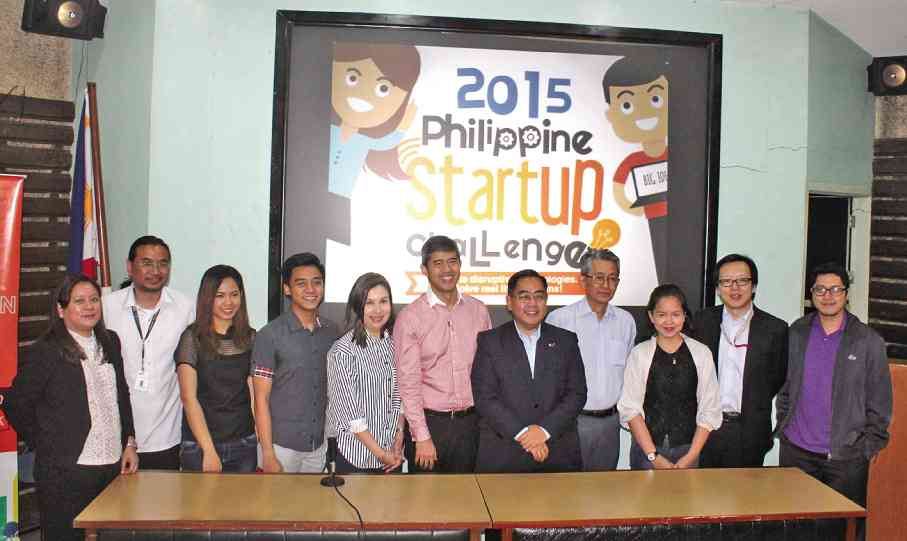
REPRESENTATIVES from DOST-ICT Office, PSIA, SPRING.ph, POD, and Huawei unite for 2015 Philippine Startup Challenge. photo by Mark Anthony Toldo
The Department of Science and Technology-Information and Communications Technology (DOST-ICT Office) and the Philippine Software Industry Association (PSIA) dare the Filipino youth to craft bolder, more creative and socially relevant technological innovations that could solve real life problems through the 2015 Philippine Startup Challenge (PSC).
“We believe that it is part of our duty in the side of the government to inspire this generation to construct innovations that could help and improve the lives of Filipinos, as well as people from other parts of the world,” DOST-ICT office deputy executive director for E-Innovation Monchito Ibrahim told reporters in a media launch last May 20 in Quezon city.
PSC is open to college students in information technology, computer studies, engineering and business administration.
In preparation for the nationwide competition, a series of Lean startup 101 bootcamps will be held this year in Cebu, Davao, Baguio, Cagayan de Oro and Metro Manila.
The top five teams will be given an opportunity to be part of PSIA-SPRING.ph’s LaunchPad program, and undergo mentoring sessions towards turning their startup ideas into reality.
Despite its infancy, foreign investors see the future of the local startup ecosystem as promising.
Venture capitalists are now starting to enter the local startup scene after some Filipino innovators have taken the limelight and changed the way people communicate, such as Maria Ressa who founded social news network Rappler.com, Dennis Mendiola who developed online instant messaging system ‘Chikka,’ RJ David and his wife Arianne David who pioneered local classified advertisements website ‘Sulit.com.ph’ which later on rebranded into ‘OLX.com.ph’, and Jay Fajardo who founded the first and largest local Wi-Fi hotspot operator ‘Airborne access.’
As of March 2014, there have been 47 reported angel investors or venture capitalists that have made at least one investment in the local startup market with Kickstart and IdeaSpace as most active players, a World Startup Wiki data revealed.
However, most startups are Internet dependent, thus making Internet a great challenge for startups to proliferate across the country.
According to a study on consumer Internet speeds in May, the Philippines has the second slowest average download speed among 22 Asian countries and ranked 176th out of 202 countries worldwide, with just 3.64 megabytes per second (Mbps).
The global average broadband download speed is 23.3Mbps.
“The startups are getting what they get because that’s what they have, they have no other choice. But if it were in a better environment and the Internet was better patterned cheaper then the startups would be better,” PSIA’s Software Products Incubation Group (SPRING.ph) Mentor Cliff Eala said.
Meanwhile, the government admits the Internet connectivity and service in the country is at its poorest but promises to solve the problem in three to five years through a government project that will provide free Internet access in public places in different regions especially to the third to sixth class municipalities.
“The project will allow the Filipinos out there in the remote areas to be at equal footing with people here in metro manila. It’s a big challenge because the Philippines is an archipelago. The cost of putting up infrastructures across the country is high,” Ibrahim explained.
However, SPRING.ph refuted the gravity of effect that the current local Internet connectivity status might have been bringing to the growth of the local startup ecosystem.
“Startups don’t really need a lot of Internet. What you need is to know your customer. There are lots of ideas. What we see as mentors is connecting the startups with the market or customer—that’s the biggest challenge, not the Internet,” SPRING.ph Co-founder Ito Gruet said.
“Places on Demand” (POD), an online concierge and management system for residential buildings, was one of the finalists in 2014 PSC that has made it to the top 23 out of 1,028 startups that have advanced to the incubation round of another startup competition organized by the largest privately funded market technology incubator based in the Philippines, the IdeaSpace Foundation Inc.
POD was pioneered by three recent graduates in Information Technology at Ateneo de Davao University.
Venturing into a startup business at a young age with no background in business, and no idea on how their product will compete with established listing services, was a tough job for the team.
“We talked and decided we need to change our point of view in dealing with the problem, so we decided to focus on the residential building management side of the product,” POD chief information officer (CIO) Justin Symon Mearns told the Inquirer in an interview.
The team decided to re-evaluate the market and realized the need to redirect the product into data analytics where building owners can gather insights and significant data from their tenants.
By using POD, owners can track the behavior of their tenants while tenants can request services through their smartphones, which the team claims necessary for improvements in building management and can eventually translate to an increase in sales and even reduction in unwanted costs to building owners.
The team plans to penetrate the local market first and eventually expand their product and services after gaining significant amount of data and statistics.
Currently, they are still testing their prototype and gathering data to come up with accurate pricing for POD.

